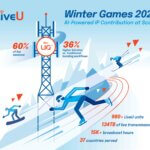A leading US broadcaster successfully deployed Evertz technology and expertise during the 2022 FIFA World Cup to ensure that its viewers could enjoy high quality coverage of the live games and events taking place throughout the tournament.
As the global leader in media and entertainment technology solutions, Evertz was able to meet all the key requirements specified by broadcaster (which has the Spanish US rights) for its 2022 FIFA World Cup coverage.
These included high quality video; support for 1080p HDR; ultra-low end to end latency across all signal types; full 16 channel audio support and support for multiple IP transport protocols including UDP/RTP, SRT, Zixi, and RIST.
To maximize its investment and ensure longevity, the broadcaster also specified that it wanted an agile, reusable app-based solution that could be repurposed for new and existing workflows without changing physical hardware.
The solution delivered by Evertz was its next generation XPS UHD/3G/HD streaming platform for contribution over IP networks. With this encode/decode in place, the broadcaster was able to receive over 40 1080p signals from Qatar, each supporting HDR and 16 audio channels.
The ultra-low latency that is a significant feature of XPS played a pivotal role in success of this project.
The signals originating in Qatar were encoded using HEVC and reliably transported using Secure Reliable Transport (SRT) for protection against packet loss over a private IP network.
On the receive side, the broadcaster used an XPS receiver located at its Florida-based facility, which decoded the signals to 1080p over SMPTE ST 2110.
“The XPS met all our customer’s requirements and challenges, and performed perfectly throughout the event,” says Harjinder Sandhu, Product Manager for Compression.
“By choosing a high density solution with up to four channels per module, they benefited from having a system with a much smaller footprint.
“They were also able to integrate directly with our ST2110 facility for remote production thanks to the XPS’s support for SDI and ST2110 interfaces. This meant they had no requirement for SDI/SD2110 gateways.”
The Evertz XPS comes in various configurations and for this application, the broadcaster chose the 5782XPS because it allowed multiple HEVC 10-bit 4:2:2 encoded 3G-SDI signals to be sent from Qatar to the US where they were decoded into multiple HEVC ST2110.
As a software-defined HEVC and H.264 10-bit 4:2:2 real-time encoding/decoding platform, the XPS is ideal for live or cloud-based applications where secure, high quality and low-latency is essential.
Its app architecture allows customers to repurpose their systems for multiple events where the number of encode/decode paths, network transport, and source interface may vary.
Apps available on the XPS platform include bulk 3G encoder, bulk 3G decoder, bi-directional encoder/decoder, 4K or 3G, SDI or ST2110. In this case, the broadcaster changed the function of some of the 5782XPS decoders in the US to encode feeds with HEVC over SRT.
The XPS provides a solution for live sports and entertainment events where broadcasters need reliable, cost-effective and high quality contribution encoding over private or public IP networks using SRT or Reliable Internet Streaming Protocol (RIST).
The platform can also be used as the on-ramp and contribution encoder for cloud production or playout hosted by public cloud providers.
XPS integrates with MAGNUM OS, Evertz’ Software Defined Video Networking (SDVN) Orchestration, Monitoring and Analysis software.
It also supports AWMA NMOS and can be added to any ST2110 IP networks where operators can visualize and route flows using Evertz’ VUE interface.
Advanced monitoring data is available to engineering staff, providing remote access to resolve issues from a central location ensuring uptime for live events.






